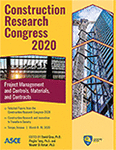Construction Research Congress 2020
Timings of Accomplishments for Facility Design Standardization Critical Success Factors in Capital Projects
Publication: Construction Research Congress 2020: Project Management and Controls, Materials, and Contracts
ABSTRACT
The researchers have adopted 15 standardization critical success factors (CSFs) from Construction Industry Institute (CII) to help the industry achieve higher levels of facility standardization. This study collects and analyzes information on the timing of accomplishments of 43 case projects from eight case programs for each CSF. Accomplishment of critical success factors on recommended time/phase in any project (timely accomplishment) helps achieve higher levels of standardization, and therefore helps reap considerable standardization benefits. Therefore, the goal of the study is to identify the CSFs that are accomplished on time as well as those that are delayed in relation to the CII recommended timings. The results of this study show that the timeliest (accomplished on CII recommended timing) CSFs, in terms of accomplishment timings, are discipline to maintain standardization, recognition of risk of standardization, define standardization approach, constructability of standardization, and supply chain development. Furthermore, this study also finds that the most delayed (not accomplished on CII recommended timing) CSFs, in terms of accomplishment timings, are standardization early identification, alignment and approval, benefits and tradeoffs recognition/evaluation, feasibility analysis of standardization, and applied knowledge. Industrial sectors should give attention to these delayed CSFs. It is important for the industrial sector to focus on CSFs that are not being accomplished on time. The researchers believe that if the industry accomplishes these CSFs in timely fashion, it will be able to achieve higher levels of standardization and improve agility, predictability, and cost effectiveness. Herein lies the contribution of this study. This study provides a comprehensive understanding of CSFs accomplishment in capital projects and support industry in achieving higher levels of standardization, as well as improve agility, predictability, and cost effectiveness. The researchers believe that if the industry accomplishes these CSFs earlier, it will be able to achieve higher levels of standardization and improve agility, predictability, and cost effectiveness.
Get full access to this article
View all available purchase options and get full access to this chapter.
ACKNOWLEDGEMENT
The results and information in this paper are based on research funded by the Construction Industry Institute (CII) by means of the Research Team for UMMC-01 Standardization. The writers wish to thank the Construction Industry Institute (CII) for their support. Additionally, the authors would like to express their gratitude to the case-study participants, who donated their valuable time and effort for this study.
REFERENCES
Choi, J.O. (2014). “Links between Modularization Critical Success Factors and Project Performance”. Civil, Architectural and Environmental Engineering, Austin, TX, The University of Texas at Austin, Ph.D.: 261. Available at: https://repositories.lib.utexas.edu/handle/2152/25030
Choi, J.O. and O'Connor, J.T., (2014). “Modularization critical success factors accomplishment: Learning from case studies.” Construction Research Congress 2014: Construction in a Global Network (pp. 1636-1645).
Choi, J.O., Shane, J.S., Kwak, Y.H. and Shrestha, B.K. (2018). “Achieving Higher Levels of Facility Design Standardization in the Upstream, Midstream, and Mining Commodity Sector: Barriers and Challenges.” Construction Research Congress 2018, pp. 278-287.
Construction Industry Institute (CII). (2006). “Constructability implementation guide.” The University of Texas at Austin: Construction Industry Institute, Austin, TX.
Construction Industry Institute (CII). (2012). “How to Optimize; how to maximize.” The University of Texas at Austin: Construction Industry Institute, Austin, TX.
Construction Industry Institute (CII). (2014). “Industrial Modularization: Five Solution Elements.” The University of Texas at Austin: Construction Industry Institute, Austin, TX.
Construction Industry Institute (CII). (2019). “Achieving Higher Levels of Facility Standardization in Upstream, Midstream, and Mining (UMM) Commodity Market.” The University of Texas at Austin: Construction Industry Institute, Austin, TX.
Gibb, A.G. and Isack, F. (2001). “Client drivers for construction projects: implications for standardization.” Engineering, Construction and Architectural Management, 8(1), pp.46-58. Available at: https://www.emeraldinsight.com/doi/pdfplus/10.1108/eb021169
Gibb, A.G. and Isack, F. (2003). “Re-engineering through pre-assembly: client expectations and drivers.” Building Research & Information, 31(2), pp.146-160.
O’Connor, J.T., O’Brien, W.J. and Choi, J.O. (2014). Critical success factors and enablers for optimum and maximum industrial modularization. Journal of Construction Engineering and Management, 140(6), p.04014012.
Nekoufar, S. and Karim, A. (2011). “Project Perspectives: The annual publication of International Project Management Association.” Project Management Association Finland (PMAF).Vol. XXXIII, pp.72-77.
Information & Authors
Information
Published In
Construction Research Congress 2020: Project Management and Controls, Materials, and Contracts
Pages: 898 - 906
Editors: David Grau, Ph.D., Arizona State University, Pingbo Tang, Ph.D., Arizona State University, and Mounir El Asmar, Ph.D., Arizona State University
ISBN (Online): 978-0-7844-8288-9
Copyright
© 2020 American Society of Civil Engineers.
History
Published online: Nov 9, 2020
Published in print: Nov 9, 2020
Authors
Metrics & Citations
Metrics
Citations
Download citation
If you have the appropriate software installed, you can download article citation data to the citation manager of your choice. Simply select your manager software from the list below and click Download.
